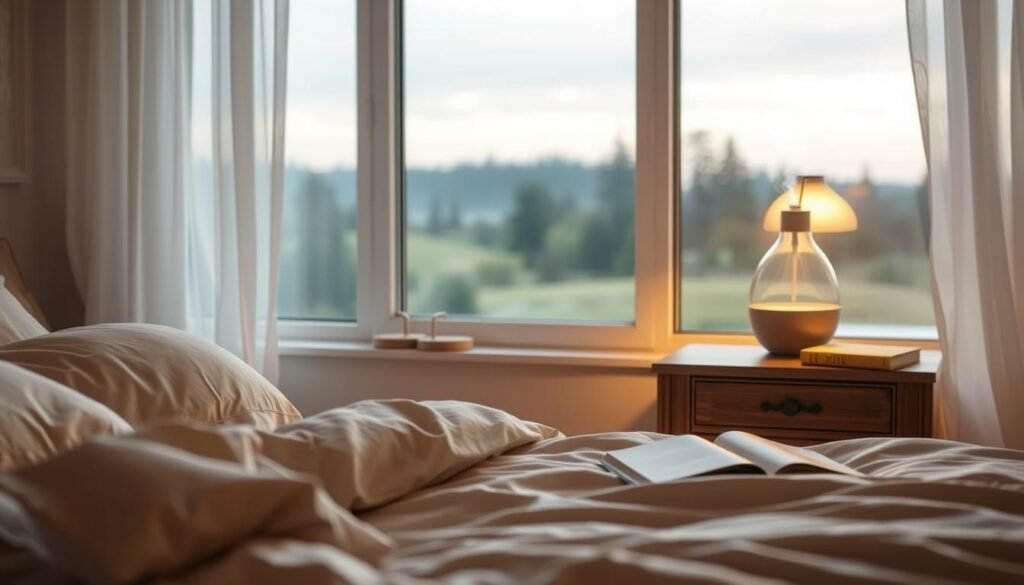Improve Sleep Hygiene for an Energy Boost

Did you know that nearly 1 in 3 adults in the United States doesn’t get enough sleep?
Obtaining healthy rest is crucial for both physical and mental health, enhancing productivity and overall quality of life. Improving sleep hygiene practices can significantly impact one’s energy levels, leading to a noticeable energy boost. By focusing on better sleep habits, individuals can experience a substantial improvement in their daily energy and overall well-being.
Key Takeaways
- Healthy rest is essential for physical and mental health.
- Improving sleep hygiene can lead to an energy boost.
- Better sleep habits enhance productivity and quality of life.
- Nearly 1 in 3 adults in the US doesn’t get enough rest.
- Focusing on sleep quality can significantly impact daily energy.
The Connection Between Sleep and Energy
The connection between sleep hygiene and energy boost is more than just a correlation; it’s a vital physiological process. Sleep quality plays a significant role in determining our daily energy levels. When we sleep, our body repairs and rejuvenates itself, directly impacting how we function during the day.
Research has shown that poor sleep can have a negative effect on various aspects of health, including thinking ability, mood, heart health, and immune health. “Sleep is essential for physical and mental restoration,” as noted by sleep researchers. The body’s ability to regulate energy is closely tied to the quality of sleep.
How Sleep Quality Affects Daily Energy Levels
Sleep quality is a critical factor in maintaining energy levels throughout the day. When sleep is fragmented or insufficient, it can lead to fatigue, decreased productivity, and a weakened immune system. On the other hand, high-quality sleep enhances cognitive function, boosts energy, and supports overall health.
A study highlighted that individuals who achieved better sleep quality reported higher energy levels and improved mental clarity. This underlines the importance of sleep hygiene practices in daily life.
The Science Behind Sleep Cycles and Energy Production
Sleep cycles, including REM and non-REM sleep, are crucial for energy production. During these cycles, the body regulates various physiological processes, including those that impact energy levels. Understanding the science behind sleep cycles can provide insights into how to improve sleep quality and, consequently, energy production.
“The sleep-wake cycle is regulated by an intricate system involving the brain, hormones, and other bodily functions,” says a leading sleep expert. “Disruptions to this cycle can significantly affect energy levels.”
By focusing on improving sleep quality and understanding the role of sleep cycles, individuals can take steps towards enhancing their daily energy levels. This involves adopting good sleep hygiene practices and creating an environment conducive to restful sleep.
Understanding Sleep Hygiene & Energy Boost Potential
To harness the energy-boosting benefits of sleep, it’s essential to grasp the fundamentals of sleep hygiene. Sleep hygiene encompasses a range of practices that help improve the quality of our sleep.
Defining Good Sleep Hygiene Practices
Good sleep hygiene includes setting a strict sleep schedule, following a bedtime routine, forming healthy habits, and optimizing your bedroom for sleep. These practices are crucial for enhancing the quality of our rest.
Key components of good sleep hygiene practices include:
- Maintaining a consistent sleep schedule
- Creating a sleep-conducive environment
- Avoiding stimulants before bedtime
- Engaging in relaxing bedtime routines
How Proper Sleep Habits Translate to Increased Energy
Proper sleep habits play a significant role in determining our daily energy levels. When we adhere to good sleep hygiene practices, we can expect to see an improvement in our energy levels.
| Sleep Hygiene Practice | Impact on Energy |
|---|---|
| Consistent Sleep Schedule | Regulates body’s internal clock, leading to more consistent energy levels |
| Sleep-Conducive Environment | Improves sleep quality, resulting in higher energy levels during the day |
| Avoiding Pre-Bedtime Stimulants | Enhances the ability to fall asleep, leading to better rest and more energy |
The Cost of Poor Sleep on Productivity and Health
Poor sleep hygiene can have significant negative impacts on both productivity and overall health. It can lead to decreased energy levels, reduced concentration, and a weakened immune system.
The consequences of poor sleep hygiene include:
- Decreased productivity at work or school
- Increased risk of chronic diseases like diabetes and heart disease
- Impaired cognitive function and mood disturbances

Assessing Your Current Sleep Patterns
To improve sleep quality, it’s essential to evaluate your current sleep habits. Understanding your sleep patterns can help identify areas for improvement, leading to better rest and increased energy levels.
Common Signs of Poor Sleep Hygiene
Poor sleep hygiene can manifest in various ways. Some common signs include:
- Difficulty falling asleep or staying asleep
- Frequent awakenings during the night
- Feeling tired or groggy upon waking
- Irregular sleep schedules
- Consuming caffeine or electronics before bedtime
Recognizing these signs is the first step towards making positive changes to your sleep habits.
Tools to Track and Evaluate Your Sleep Quality
Several tools can help track and evaluate sleep quality. These include:
- Sleep diaries: Keeping a record of your sleep patterns can provide valuable insights.
- Wearable devices: Many wearables, such as smartwatches and fitness trackers, offer sleep tracking features.
- Sleep apps: Applications like Sleep Cycle and Pillow can monitor sleep patterns and provide detailed analysis.
Using these tools can help you understand your sleep patterns more effectively.
Interpreting Your Sleep Data
Once you’ve collected sleep data, interpreting it correctly is crucial. Look for patterns such as:
- Consistency in sleep schedules
- Duration of deep sleep and REM sleep
- Frequency of awakenings
Understanding these patterns can help you make informed decisions to improve your sleep hygiene.
By assessing your current sleep patterns and making necessary adjustments, you can significantly enhance your sleep quality and overall well-being.
Creating the Optimal Sleep Environment
Creating an optimal sleep environment is key to unlocking better sleep hygiene. A well-designed bedroom can significantly enhance the quality of your sleep, leading to more energized days.
Temperature, Light, and Noise Considerations
To create a sleep-conducive environment, it’s essential to control the factors that most affect your sleep: temperature, light, and noise.
- Temperature: Keeping your bedroom cool, around 60-67°F (15-19°C), can promote better sleep.
- Light: Darkness is crucial for the production of melatonin, the sleep hormone. Use blackout curtains or blinds to keep your bedroom dark.
- Noise: A quiet environment is vital. Consider using earplugs or a white noise machine to minimize disruptive sounds.

Choosing the Right Mattress and Pillows
The right mattress and pillows can make a significant difference in your sleep quality. Invest in a comfortable mattress that supports your preferred sleeping position.
Pillows should be chosen based on their loft and material. For example, side sleepers may prefer higher-loft pillows, while back sleepers may prefer lower-loft options.
Tech-Free Bedroom Strategies
Maintaining a tech-free bedroom is crucial for improving sleep hygiene. Avoid having TVs, computers, and smartphones in your bedroom.
- Establish a tech-free zone in your bedroom to associate it with sleep.
- Use alarm clocks instead of relying on your smartphone to wake you up.
- Implement a pre-bedtime routine that doesn’t involve screens, such as reading or meditation.
By implementing these strategies, you can create a sleep environment that promotes relaxation and improves the quality of your sleep.
Establishing a Consistent Sleep Schedule
To enhance sleep hygiene, setting a regular sleep schedule is essential, as it normalizes sleep as a vital part of daily routine. Having a set schedule helps regulate the body’s internal clock, making it easier to fall asleep and wake up feeling refreshed.
Setting Fixed Sleep and Wake Times
Setting fixed sleep and wake times is the cornerstone of a consistent sleep schedule. This involves deciding on a specific bedtime and wake-up time that allows for the recommended amount of sleep each night, typically 7-9 hours for adults. Consistency is key, even on weekends or days off.
- Choose a bedtime and wake-up time that works for you.
- Stick to your schedule, even on weekends.
- Gradually adjust your sleep schedule if needed, rather than making abrupt changes.
Weekend Sleep Consistency Challenges
Maintaining a consistent sleep schedule on weekends can be challenging due to social engagements or the desire to sleep in. However, deviating from your routine can disrupt your body’s internal clock, making it harder to wake up early on Monday morning.
| Day | Bedtime | Wake-Up Time |
|---|---|---|
| Monday | 10:00 PM | 6:00 AM |
| Saturday | 11:00 PM | 7:00 AM |
| Sunday | 10:00 PM | 6:00 AM |
Adjusting Your Schedule Gradually
If you need to adjust your sleep schedule, it’s best to do so gradually. Adjusting your bedtime by 15-30 minutes every few days can help your body adapt to the new sleep timing without feeling too disrupted.
- Identify your desired sleep schedule.
- Calculate the difference between your current and desired sleep times.
- Adjust your sleep schedule gradually, allowing your body to adapt.
Pre-Sleep Routines That Enhance Sleep Quality
A well-crafted pre-sleep routine is the key to unlocking better sleep and more energized days. By incorporating specific activities and habits into your evening schedule, you can signal to your body that it’s time to sleep, thereby enhancing the quality of your rest.
Relaxation Techniques Before Bed
Relaxation techniques are essential for calming the mind and body before sleep. Techniques such as deep breathing exercises, progressive muscle relaxation, and meditation can help reduce stress and anxiety, making it easier to fall asleep. For example, a study found that mindfulness meditation improved sleep quality in individuals with chronic insomnia.
To incorporate these techniques into your routine, start by allocating 10-15 minutes before bed for relaxation. You can use guided meditation apps or videos that lead you through relaxation exercises. Consistency is key, so try to practice these techniques at the same time every night.

The Ideal Wind-Down Timeline
The ideal wind-down timeline can vary from person to person, but a general guideline is to start winding down at least 30 minutes to an hour before bedtime. This allows your body to transition from a state of activity to relaxation. During this time, you can engage in calming activities such as reading, listening to soothing music, or taking a warm bath.
It’s also beneficial to establish a consistent sleep schedule and bedtime routine. This helps regulate your body’s internal clock, making it easier to fall asleep and wake up at the same time every day.
Activities to Avoid Before Sleep
Certain activities can disrupt your sleep by stimulating your brain or interfering with your body’s natural sleep-wake cycle. It’s advisable to avoid screens (such as those from smartphones, tablets, and computers) at least an hour before bedtime due to the blue light they emit, which can suppress melatonin production.
Additionally, avoid engaging in vigorous exercise or consuming caffeine and heavy meals close to bedtime. These can make it difficult to fall asleep and reduce the quality of your sleep.
By understanding the importance of pre-sleep routines and incorporating relaxation techniques into your evening schedule, you can significantly enhance your sleep quality. This, in turn, can lead to more energized days and an overall improvement in well-being.
Technology’s Impact on Sleep Hygiene
The advent of technology has significantly altered our sleep patterns, making it crucial to understand its impact on sleep hygiene. As we navigate the digital landscape, it’s essential to recognize both the disruptive and beneficial effects technology can have on our sleep.
Blue Light and Sleep Disruption
One of the most significant ways technology affects sleep is through blue light emission. Devices such as smartphones, tablets, and computers emit blue light, which can suppress the production of melatonin, the hormone responsible for regulating sleep. Exposure to blue light in the evening can trick the brain into thinking it’s still daytime, making it harder to fall asleep.
To mitigate this effect, consider using blue light filtering glasses or apps that filter out blue light from screens. Additionally, many devices now come with built-in features to reduce blue light emission during certain hours of the day.
Helpful Sleep Apps and Devices
While technology can disrupt sleep, it can also be a valuable tool for improving sleep hygiene. Sleep tracking apps and wearable devices can monitor sleep patterns, providing insights into sleep quality and suggesting improvements. Some popular sleep apps include those that offer guided relaxation techniques and smart alarms that wake users during a light sleep phase.
- Guided meditation and relaxation apps
- Smart alarm clocks that monitor sleep patterns
- Wearable devices that track sleep quality
Setting Digital Boundaries for Better Rest
Establishing digital boundaries is crucial for protecting sleep hygiene. This includes setting a tech curfew before bedtime, creating a tech-free zone in the bedroom, and using apps that promote relaxation. By being mindful of technology use before bed, individuals can improve their sleep quality and overall well-being.
- Set a specific “no screen” time before bed
- Use apps that help wind down, such as meditation or reading apps
- Keep electronic devices out of the bedroom
By understanding the impact of technology on sleep hygiene and implementing strategies to mitigate its negative effects, individuals can take a significant step towards improving their sleep quality and overall health.
Nutrition and Hydration for Better Sleep
Proper nutrition and adequate hydration are essential components of good sleep hygiene. Consuming the right foods and staying hydrated can significantly enhance sleep quality, leading to better rest and recovery.
Foods That Promote Quality Sleep
Certain foods are known to promote better sleep due to their nutritional content. For instance, foods rich in tryptophan, such as turkey, chicken, and fish, help produce serotonin and melatonin, which regulate sleep. Other sleep-promoting foods include:
- Dairy products like milk and cheese, which contain tryptophan and calcium.
- Nuts and seeds, such as almonds and walnuts, rich in magnesium and melatonin.
- Complex carbohydrates like whole grains, which increase serotonin levels.
Timing Your Meals and Drinks
The timing of meals and hydration is crucial for maintaining good sleep hygiene. Eating a large meal close to bedtime can disrupt sleep patterns, while a light snack can be beneficial. It’s recommended to:
- Finish dinner at least 2-3 hours before bedtime.
- Have a light snack if hungry before bed, opting for sleep-promoting foods.
- Avoid caffeinated beverages and heavy fluids close to bedtime.
Substances to Limit or Avoid
Some substances can significantly disrupt sleep quality. It’s essential to limit or avoid:
- Caffeine, found in coffee, tea, and some sodas, as it can interfere with sleep.
- Alcohol, which can disrupt sleep patterns and reduce sleep quality.
- Spicy and high-fat foods, which can cause discomfort and indigestion.
By being mindful of what we eat and drink, and when, we can improve our sleep hygiene and enjoy better rest.
Physical Activity’s Role in Sleep and Energy
Engaging in regular exercise can lead to better sleep quality and enhanced daily energy. Physical activity is a crucial element in maintaining a healthy balance between rest and activity, which is vital for overall well-being.
Exercise Timing for Optimal Sleep
The timing of exercise plays a significant role in its impact on sleep. Research suggests that exercising too close to bedtime can interfere with sleep quality for some individuals, although this can vary from person to person. It’s generally recommended to finish vigorous exercise a few hours before bedtime to allow the body time to wind down.
Optimal Exercise Timing Strategies:
- Schedule vigorous exercise in the morning or early afternoon.
- Consider gentle stretching or yoga in the evening to help relax the body.
- Experiment with different exercise timings to find what works best for you.
Types of Exercise That Improve Sleep Quality
Not all exercises are created equal when it comes to improving sleep quality. Activities that promote relaxation and reduce stress are particularly beneficial when done appropriately before bedtime.
Examples of sleep-promoting exercises include:
- Yoga: Combines physical movement with deep breathing and relaxation techniques.
- Swimming: A low-impact exercise that can help reduce stress.
- Tai Chi: A slow, meditative form of exercise that promotes relaxation.
Balancing Activity and Rest for Maximum Energy
Achieving a balance between physical activity and rest is crucial for maximizing energy levels. While regular exercise can boost energy, it’s equally important to allow for adequate rest and recovery.
Tips for Balancing Activity and Rest:
- Listen to your body: Rest when needed, and don’t overexert yourself.
- Prioritize sleep: Ensure you’re getting enough quality sleep each night.
- Stay hydrated: Adequate hydration is essential for both energy and recovery.
By incorporating physical activity into your daily routine and balancing it with rest, you can improve both sleep quality and overall energy levels.
Conclusion: Your Path to Energized Days Through Better Sleep
Prioritizing a good night’s sleep is essential for optimizing overall health. By understanding the connection between sleep and energy, individuals can take the first step towards achieving energized days. Implementing good sleep hygiene practices, such as creating an optimal sleep environment, establishing a consistent sleep schedule, and avoiding stimulating activities before bedtime, can significantly improve sleep quality.
Better sleep hygiene leads to increased energy levels, improved productivity, and overall well-being. By making simple changes to daily routines and sleep habits, individuals can wake up feeling refreshed and ready to tackle the day. Focus on making sleep a priority to experience the benefits of energized days.
By incorporating the strategies discussed, such as relaxation techniques, a tech-free bedroom, and a balanced diet, individuals can improve their sleep hygiene and enjoy better sleep. This, in turn, will lead to more energized days and a better quality of life.
FAQ
What is sleep hygiene, and how does it impact energy levels?
How can I assess my current sleep patterns to identify areas for improvement?
What factors should I consider when creating an optimal sleep environment?
How can I establish a consistent sleep schedule, and why is it important?
What pre-sleep routines can enhance sleep quality, and how can I implement them?
How does technology impact sleep hygiene, and what digital boundaries can I set?
What role does nutrition and hydration play in sleep quality, and what foods promote better sleep?
How does physical activity influence sleep and energy levels, and what types of exercise are beneficial?
Can improving sleep hygiene really lead to an energy boost, and how long does it take to notice a difference?
Are there any long-term benefits to maintaining good sleep hygiene practices?
🌸 Discover Weight Management Supplements That Works — Handpicked for You
Curated health & beauty essentials our readers trust — explore your new self-care favorites.
🌸 Discover Beauty That Works — Handpicked for You
Curated health & beauty essentials our readers trust — explore your new self-care favorites.
💖 Connect with SmartWellnessBeauty
Join our wellness & beauty community for daily inspiration, mindful living, and radiant self-care — follow us across your favorite platforms.
Explore More ✨














What do you think?
Show comments / Leave a comment